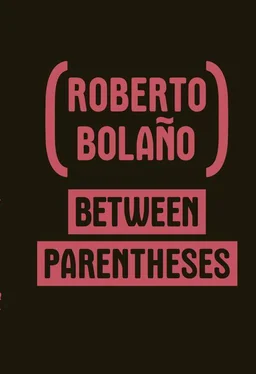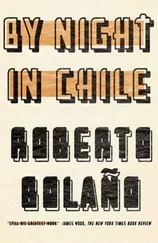Roberto Bolaño - Between Parentheses - Essays, Articles and Speeches, 1998-2003
Здесь есть возможность читать онлайн «Roberto Bolaño - Between Parentheses - Essays, Articles and Speeches, 1998-2003» весь текст электронной книги совершенно бесплатно (целиком полную версию без сокращений). В некоторых случаях можно слушать аудио, скачать через торрент в формате fb2 и присутствует краткое содержание. Год выпуска: 2011, Издательство: New Directions, Жанр: Публицистика, Критика, на английском языке. Описание произведения, (предисловие) а так же отзывы посетителей доступны на портале библиотеки ЛибКат.
- Название:Between Parentheses: Essays, Articles and Speeches, 1998-2003
- Автор:
- Издательство:New Directions
- Жанр:
- Год:2011
- ISBN:нет данных
- Рейтинг книги:4 / 5. Голосов: 1
-
Избранное:Добавить в избранное
- Отзывы:
-
Ваша оценка:
- 80
- 1
- 2
- 3
- 4
- 5
Between Parentheses: Essays, Articles and Speeches, 1998-2003: краткое содержание, описание и аннотация
Предлагаем к чтению аннотацию, описание, краткое содержание или предисловие (зависит от того, что написал сам автор книги «Between Parentheses: Essays, Articles and Speeches, 1998-2003»). Если вы не нашли необходимую информацию о книге — напишите в комментариях, мы постараемся отыскать её.
The Savage Detectives
Between Parenthese
Between Parentheses: Essays, Articles and Speeches, 1998-2003 — читать онлайн бесплатно полную книгу (весь текст) целиком
Ниже представлен текст книги, разбитый по страницам. Система сохранения места последней прочитанной страницы, позволяет с удобством читать онлайн бесплатно книгу «Between Parentheses: Essays, Articles and Speeches, 1998-2003», без необходимости каждый раз заново искать на чём Вы остановились. Поставьте закладку, и сможете в любой момент перейти на страницу, на которой закончили чтение.
Интервал:
Закладка:
PHONE CONVERSATIONS WITH PEDRO LEMEBEL
The first thing Lemebel asked me was how old I was when I left Chile. Twenty, I said. So how could you lose your Chilean accent? he asked. I don’t know, but I lost it. You can’t have lost it, he said, by the time you’re twenty you can’t lose anything. You can lose lots of things, I said. But not your accent, he said. Well, I lost it, I said. Impossible, he said. That might have been the end of everything: the conversation didn’t seem to be going anywhere. But Lemebel is the greatest poet of my generation and from Spain I had already admired the glorious and provocative wake left by his performance art duo Las Yeguas del Apocalipsis (The Mares of the Apocalypse). So I took the plunge and we went to eat at a Peruvian restaurant and I talked to all the other people we were with — Soledad Bianchi, Lina Meruane, Alejandra Costamagna, the poet Sergio Parra — and meanwhile Lemebel lapsed into a state of general melancholy and was silent for the rest of the evening, which was too bad. No one speaks a more Chilean Spanish than Lemebel. Lemebel doesn’t need to write poetry to be the best poet of my generation. No one goes deeper than Lemebel. And also, as if that weren’t enough, Lemebel is brave. That is, he understands how to open his eyes in the darkness, in those lands where no one dares to tread. How do I know all this? Easy. By reading his books. And after reading them, in exhilaration, in hilarity, in dread, I called him on the phone and we talked for a long time, a long conversation of golden howls, during which I recognized in Lemebel the indomitable spirit of the Mexican poet Mario Santiago, dead, and the blazing images of La Araucana , dead, forgotten, which Lemebel brought back to life and then I knew that this queer writer, my hero, might be on the side of the losers but that victory, the sad victory offered by Literature (capitalized, as it is here), was surely his. When everyone who has treated him like dirt is lost in the cesspit or in nothingness, Pedro Lemebel will still be a star.
THE FAT REPORTER
One day a fat reporter came to interview me. He wasn’t as young as the others. He might have been my age, maybe a bit younger, and he was from La Serena. He gave me a copy of his paper, a La Serena paper, and then he sat down in a chair, panting, and he spotted my cigarettes and asked for one. He didn’t buy them anymore because he had stopped smoking, but that morning he was in the mood for one.
There was no photographer with him, so he took my picture. Do you know how these cameras work? he asked. I looked at the camera and said I had no idea. For a while we stood there studying the camera. A photographer colleague at La Serena had loaned it to him. His indecisiveness, I soon realized, was greater than mine. Let’s take the pictures on the balcony, he said, there’s more light. I don’t know why, but I didn’t like the idea. I have a sore throat, I said, I don’t want to go outside. The problem is you smoke too much, he said, leaving his cigarette in the ashtray. Finally I sat in a chair and I said take the pictures now or never. He sighed and took three or four pictures. Being a local reporter is boring, he said. But there must be interesting parts too, I said. The guys on the police beat have more fun, he said. Yes, there are interesting parts. Like in any life.
CHILEAN LITERATURE
This is what Chilean literature taught me. Ask for nothing, because you’ll be given nothing. Don’t get sick because no one will help you. Don’t ask to be included in any anthology because your name will always be omitted. Don’t fight because you’ll always be defeated. Don’t turn your back on power because power is everything. Don’t be stinting in your praise for idiots, the dogmatic, the mediocre, if you don’t want to live a season in hell. Life here goes on more or less unchanged.
RODRIGO PINTO
A writer sometimes has absolutely solid hunches. One of my few hunches is Rodrigo Pinto. There can’t be many critics like him in Chile. He’s a priceless character: every pore of Rodrigo Pinto speaks to us of his love for literature, his humor, his wisdom.
Rodrigo Pinto is that mythical Chilean, the one who has read everything or is prepared to read everything. And on top of it all, he’s a good person. Rodrigo Pinto can go from Wittgenstein to Juan Emar, from Stendhal to Claude Simon without blinking. I thought readers like that had disappeared, or were holed up in Viña, or Villa Alemana, or Valdivia. But Rodrigo Pinto lives in Santiago and is still young, which means it’s possible to suppose that he’ll keep up the fight for a long time in this valley of tears. The last time I saw him, in Santiago, he had a stunning woman on each arm, one dark-haired and the other a redhead, and he was on his way to a Japanese restaurant for sushi.
WOMEN WRITERS
I’m not sure whether it’s under the reproving eye of Gabriela Mistral, Violeta Parra, María Luisa Bombal or Diamela Eltit, but there’s a generation of women writers out there who promise to be insatiable. Two among them clearly stand out. They are Lina Meruane and Alejandra Costamagna, followed by Nona Fernández and five or six other young women armed with all the tools of good literature. Lina and Alejandra, both born in 1970, have already published books, which I’ve read. They write very differently from each another. Or rather: the forms to which their writing adheres are very different. And yet they resemble each other in the force of their writing. When they write, the reader has no choice but to follow them through the ruins of this waning century or through the apparently no-exit blaze of the coming millennium. Their prose issues from the hammer blows of conscience, but also from the intangible, and from pain. Stylistically, Lina Meruane can be associated with a certain French school (I’m thinking of Marguerite Duras, Nathalie Sarraute), more subjective and introspective, whereas Alejandra Costamagna works in the North American tradition, objective, faster-paced, less ornate. One writes in shades of gray and the other in black and white. Las Infantas [The Princesses], by Lina Meruane, and En voz baja [In a Low Voice] and Ciudadano en retiro [Citizen in Retirement], by Alejandra Costamagna, are achievements in themselves, but above all they are the firm promise of a literature that refuses to relinquish anything. The young female writers of Chile write like women possessed.
SANTIAGO
Santiago is still the same. Twenty-five years doesn’t change a city. People still eat empanadas in Chile. The empanadas of Chile are called empanadas chilenas and they can be sampled at the Nacional or the Rápido (recommended by Germán Marín). People still eat the sandwiches called barros-luco or barros-jarpa or chacareros , ergo the city hasn’t changed. The new buildings, the new streets, mean nothing. The streets of Santiago are still the same as they were ninety-eight years ago. Santiago is the same as it was when Teófilo Cid and Carlos de Rokha walked its streets. We still live in the age of the French Revolution. Our cycles are much longer and more crowded and twenty-five years is nothing.
EVERYBODY WRITES
In Chile everybody writes. I realized this one night when I was waiting to do a live television interview. A girl who had been Miss Chile, or something like that, was on before me. Maybe she’d only been Miss Santiago or Miss Burst Into Flames. Anyway, she was a tall, pretty girl, who talked with the empty poise of all Misses. She was introduced to me. When she found out that I had been a juror for the Paula contest she said that she had almost sent in a story but in the end she hadn’t been able to, and that she would submit something next year. Her confidence was impressive. I hope she’ll have time to type up her story for the 1999 contest. I wish her the best of luck. Sometimes the fact that everyone in the world writes can be wonderful, because you find fellow-writers everywhere, and sometimes it can be a drag because illiterate jerks strut around sporting all the defects and none of the virtues of a real writer. As Nicanor Parra said: it might be a good idea to do a little more reading.
Читать дальшеИнтервал:
Закладка:
Похожие книги на «Between Parentheses: Essays, Articles and Speeches, 1998-2003»
Представляем Вашему вниманию похожие книги на «Between Parentheses: Essays, Articles and Speeches, 1998-2003» списком для выбора. Мы отобрали схожую по названию и смыслу литературу в надежде предоставить читателям больше вариантов отыскать новые, интересные, ещё непрочитанные произведения.
Обсуждение, отзывы о книге «Between Parentheses: Essays, Articles and Speeches, 1998-2003» и просто собственные мнения читателей. Оставьте ваши комментарии, напишите, что Вы думаете о произведении, его смысле или главных героях. Укажите что конкретно понравилось, а что нет, и почему Вы так считаете.












